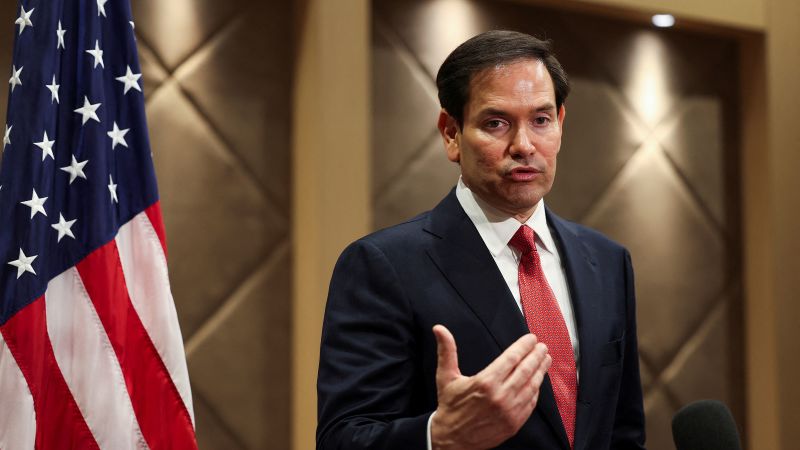On Thursday, the United States State Department communicated formally to Congress its intentions to implement comprehensive changes aimed at realigning the department’s focus according to the priorities established during the Trump administration. This sweeping overhaul includes significant efforts to decrease immigration, promote the administration’s ideological perspective, and notably, deprioritize the safeguarding and endorsement of human rights on a global scale. Such shifts represent a marked departure from traditional diplomatic practices, emphasizing a more inward-looking stance on many international issues.
The initiative for this extensive reorganization was first introduced by Secretary of State Marco Rubio in a statement made in April. On Thursday, Congress received a notification that exceeds 100 pages detailing the proposed adjustments. Key elements of this restructuring include a variety of office closures and mergers, a thorough reevaluation and renaming of existing offices, and anticipated layoffs at the headquarters situated in Washington, DC. This move is reportedly aligned with a broader agenda of budget cuts impacting various sectors of the federal government and follows the trend of plans to consolidate the US Agency for International Development (USAID) under the State Department’s umbrella.
Rubio remarked that the plan laid out for Congress represents a culmination of extensive and considerate work by senior officials within the Department. Feedback from lawmakers, various bureaus, and long-serving employees was incorporated into this blueprint. The goal is to establish a Department that can adapt more readily to the changing dynamics of international relations, thereby enhancing its capability to advocate for American interests and ensure the safety of citizens worldwide.
According to the congressional notification, which was accessed by CNN, there will be an augmented focus on migration and border control rather than on refugee issues. The current functions of the Bureau of Population, Refugees, and Migration will be merged into three new operational offices, under the direction of a newly appointed Deputy Assistant Secretary of State for Migration Matters. The restructuring aims to align more closely with core administration directives, emphasizing the government’s objective of returning undocumented migrants to their nations of origin.
One of the newly designated offices will be the Office of Remigration, envisioned as a central hub for matters concerning immigration and the tracking of repatriations. This office will be pivotal in providing a policy framework for the coordination of efforts with the Department of Homeland Security (DHS) and other relevant agencies to ensure the expeditious removal or repatriation of migrants. Furthermore, it will utilize State Department resources to facilitate the voluntary return of individuals to their legal status or home countries.
Significantly, the systematization of the Bureau of Democracy, Human Rights, and Labor indicates a shift towards promoting the administration’s interpretation of American and Western values. This bureau will be restructured under a Deputy Assistant Secretary of State specifically tasked with overseeing Democracy and Western Values, reflecting a new policy orientation. A notable creation will be the Office of Natural Rights, which is intended to ground the department’s diplomatic efforts in traditional Western notions of freedom and civil liberties, including addressing concerns surrounding free speech regressions in developed nations.
The reorganization will include a new office focusing on the promotion of free-market principles within the labor policy arena. This Office of Free Markets and Free Labor will target strategies ensuring fair competition for American workers in the global economic landscape, indicating a recalibration of approach to labor relations on an international scale.
The proposed consolidation also includes the controversial transfer of USAID’s international disaster aid functions into the Bureau of Population, Refugees, and Migration. Critics argue that this merger severely undermines USAID’s effectiveness, as its disaster response teams are trained to react promptly to global emergencies, a capability that may be hampered under the new arrangement. Concerns have been raised regarding the interim management that will oversee these critical functions until a Senate-confirmed Coordinator for Reconstruction and Stabilization is appointed.
Reassuringly, the notification clarifies that no job cuts are planned for locally employed staff or U.S. direct-hire personnel located overseas. However, substantial domestic workforce reductions are on the horizon, estimating a decrease of up to 3,448 positions from a baseline of 18,730 staff as of May 4, 2025. The domestic cuts will notably exclude personnel involved in key functions such as passport processing, law enforcement roles, and certain regional assignments, showcasing a methodical approach to managing personnel amid these extensive changes.
The State Department’s plan reflects a significant evolution in its operational dynamics and strategic priorities, laying the groundwork for a potentially transformative impact on U.S. foreign policy as it pivots toward an administration-defined agenda.



